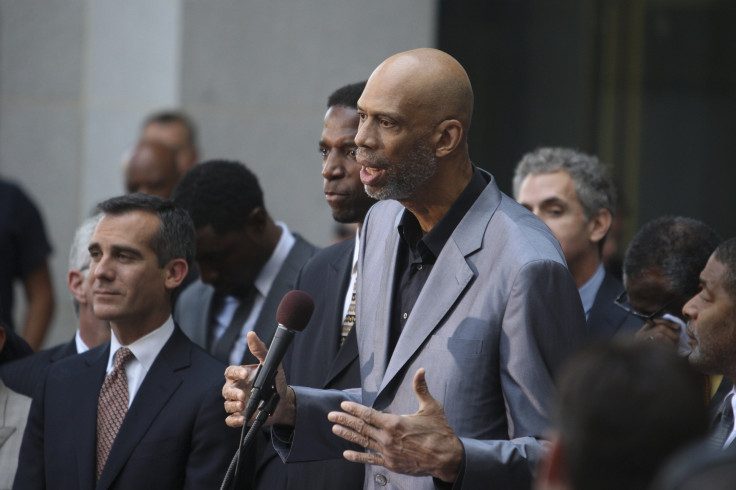Kareem Abdul-Jabbar: 'More Whites Believe In Ghosts Than Believe In Racism'

NBA legend Kareem Abdul-Jabbar spoke about the controversy surrounding Los Angeles Clippers owner Donald Sterling during ABC’s "This Week With George Stephanopoulos" on Sunday.
Abdul-Jabbar's claim was more a head-turner than an actual statistic, but the Hall of Fame center otherwise offered a valuable assessment of how the NBA can move forward post-Sterling and the state of racism in America.
“It’s something that’s still part of our culture and people hold on to some of these ideas and practices just out of habit and saying that, ‘Well, that’s the way it always was,’" the former Laker said. "But things have to change.”
In his poignant Time magazine op-ed “Welcome to the Finger-Wagging Olympics,” Abdul-Jabbar pointed out that Sterling has a long history of racist comments and, more importantly, actions. And the country should have been outraged when his actions actually had an effect on people’s lives, he said.
But instead, Abdul-Jabbar argues, people in the U.S. get worked up over the private conversation of an old rich man and “put his head on a pike” in a “quest for social justice.”
The real enemy isn’t Donald Sterling, it’s racism itself, Abdul-Jabbar says.
“I did a little bit of research, more whites believe in ghosts than believe in racism… That’s why we have shows like ‘Ghostbusters’ and don’t have shows like ‘Racistbusters.’”
Politifact did some research to see if Abdul-Jabbar’s comparison was more an eye-catcher or actually rooted in numbers. Between three polls (which worded the ghost question differently), 42 percent, 56 percent and 51 percent of whites said they believe in ghosts in some way.
Racism is of course harder to poll about. As Politifact points out, few people are likely to identify as racist, so they looked at a few polls to gauge how whites feel about racism and civil rights.
A 2013 poll found that only 17 percent of whites thought new civil rights laws were needed to reduce discrimination against blacks, while 53 percent of blacks thought so. A quarter of whites surveyed said they thought the justice system was biased, while two thirds of blacks thought the opposite. Much higher percentages of whites thought there were "some or a lot of discrimination against blacks" and that racism was "very serious" or a "somewhat serious" problem -- 57 percent and 66 percent, respectively.
About half of white Americans think racism against blacks is widespread. In 2011, more whites believed there was a stronger anti-white bias than there was an anti-black bias.
As Politifact points out, polling for belief in ghosts vs. "belief in racism" are two different animals. They rate his claims as “Mostly False,” calling his comparison “shaky.”
When asked what the NBA should do with the issue moving forward, Abdul-Jabbar said, “I think all the NBA has to do now is keep the issue in people’s minds when its appropriate. It’s not something you can constantly be harping on, but when its appropriate and they see people doing things that don’t line up with how we’re supposed to be feeling about things, then people have to speak up. It’s like watching your temperature. When someone gets a temperature, something might be wrong, you have to deal with it quickly.”
© Copyright IBTimes 2024. All rights reserved.






















